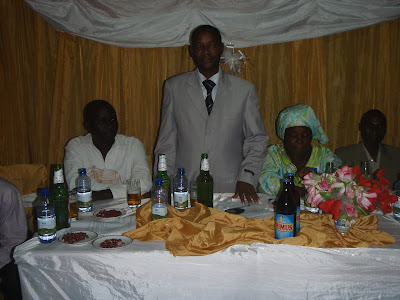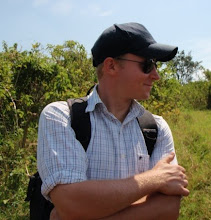Describe the most important things you accomplished during your two years of service.
Providing Americans with a better understanding of Rwanda is an accomplishment of which I am most proud. I have a blog (www.reebinrwanda.blogspot.com) and I update it with pictures, personal experiences, and current Rwandan news; I also post pictures on Facebook and I even started the unofficial Peace Corps Rwanda Facebook Group, which provides information about Rwanda and Peace Corps to new/potential volunteers and to family and friends of current volunteers. These electronic forums allow friends, family, and other interested parties to connect with me in a private interface where they can ask questions and acquire information.
Furthermore, I have a WWS contact (Lincoln Township High School); I have regular communication with Club Interact, a volunteering and community service club that is sponsored by the high school. I am also in contact with a special education school where my friend's mother is a teacher. In addition to communicating with students from these two institutions, I frequently write letters to my family, my friends, and my church community describing my experiences.
All of these groups have told to me that I have played a large role in helping them not only understand Rwanda better, but Peace Corps as well. Many of these groups, in turn, have provided me with support, both financially and morally, to be successful in Rubona, Rwamagana my current site of Peace Corps service.
Providing Rwandans a better understanding of Americans has been a successful objective for my secondary projects. After the first three months in Rubona, I created a pen-pal exchange between neighborhood children in Rubona and the schools with which I am partnered in America. I also have a pen-pal exchange for my adult English class; these pen-pal relationships are between my adult Rwandan students and my adult family friends in Chicago. Fostering these relationships has given my neighbors in Rubona a better understanding of my family, my friends, and the culture of America.
The adult English class I teach four nights a week from 6pm to 7pm also provides me with a venue to discuss American culture with my neighbors. Together we study health topics in English; these topics have included personal hygiene, how to recognize and avoid risk behavior, and the nature of the human body. Every other English lesson, however, is about American history or culture. These lessons may highlight a state or city or they may be about a particularly notable American, such as Martin Luther King, Jr. When the lesson is about one of these topics, we discuss why this person, city, or invention is important to American culture and history.
As a result of creating pen-pal relationships between neighbors and friends and sharing information about America in the classroom, my integration into the community of Rubona has been easy and enjoyable. Through respect, effective communication, and presence at site, I have received an excellent reputation among community members.
I not only enjoy a high level of integration within the community of Rubona, I am also well integrated into the Peace Corps Volunteer (PCV) community. I participate in events with fellow volunteers and I have built positive and mutually beneficial friendships and professional relationships with my peers.
I attribute my successes to both village community integration and PCV peer community integration to being reliable, responsible, reasonable, and having a positive attitude; I also overcome fears and apprehensions very easily, which allows me to be more open to new experiences, conversations, and points of view.
Just as sharing American culture with my community has helped me integrate, integrating into my community has helped me perform my primary assignments successfully. I am a trusted member of Rubona’s community and my ability to mobilize and motivate neighbors and health center staff is a direct benefit of this achievement.
As a community, we conduct personal hygiene and work place cleanliness trainings and tutorials. Working with the health center staff members on these projects, specifically, has given them a strong sense of empowerment and accomplishment. The nurses and staff of the health center, in turn, are serving their patients with more efficiency and with greater pride in their work. As a result, a higher level of patient care is being practiced, which is giving the health center more credibility among the community members it serves.
Through our trainings and tutorials, Rubona has made great strides in educating people about disease communicability and prevention. What has made the most sustainable impact, however, has been raising funds to provide Rubona’s health center with running water. With these sinks, hand washing stations, and showers, the community members I teach are putting into daily practice the lessons they have learned. More importantly, because these fixtures are permanent structures, the community will be able to continue their personal hygiene and work cleanliness exercises and tutorials well after I have gone.



